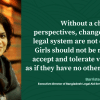Does culture and tradition always undermine women's human rights?

The (in) compatibility of women's human rights and custom, culture and tradition is one of the contested areas where women's rights have historically been and continue to be mediated through cultural practices. While some proponents argue that culture and tradition undermines women's rights, some others favour the culture and tradition that protects women's human rights. The association of women with culture and tradition is important because women are often associated more closely with the idealisations of cultural traditions than men in a given society. While women getting excluded from public spheres of work and politics, are found to be more traditional and home bound, men by virtue of employment opportunities and migration may abandon their traditional practices. So it is the societal structure and opportunities made and enjoyed by men that create a 'cultural' subordination of women undermining their rights. The cultural and traditional factors that perpetuate discrimination and hamper women's human rights are not only confined to traditional communities and societies rather the practice of patriarchal norms that are found everywhere including the western cultures.
Throughout the world there are numbers of cultural practices mostly in the family, which are sanctioned by dominant ideologies and perpetuated by social and state structures, curtail and regulate the human rights of women. These harmful cultural and traditional practices successfully bypass the national and international scrutiny because they are justified in the name of 'tolerance' and 'respect' towards culture. The harmful traditional and cultural practices include among others: female genital mutilation (FGM), honour killings, discriminatory marriage practices, son preference, widowhood rituals etc. Besides these practices there are also a good number of cultural practices that undermine the rights of women such as witch hunting or burning, caste, dowry, incest, and practices that violate women's reproductive rights.
While this is true that cultural practices and attitudes undermine the rights of women in most of the cases, it is also improper to deny the rights of women to live in a positive cultural context. In this regard, the Protocol to the African Charter on Human and People's Rights on the Rights of Women in Africa (the Maputo Protocol) contains a provision obliging the state to ensure enhanced participation of women in the formulation of cultural policies at all levels. While not condemning the culture, this provision recognises the potential of culture and its underlying necessity in order to ensure equal participation of women in the decision making.
The Maputo Protocol deserves significance on the ground that while the Convention on the Elimination of all Forms of Discrimination against Women (CEDAW) only refers the negative aspects of culture, the protocol contains both negative and positive aspects of culture. The reason behind the emphasis on positive culture is that if we see 'culture' and 'rights' as polar opposites, then there remains no possibility of common ground and this approach has been questioned. This opposing view of culture and rights indicates that with a view to realising women's rights, the moral codes and practices that they abide by have to be displaced first. This approach also implies the narrow interpretations of culture that assume the customs and traditions to be natural and unchangeable.
However, culture also contains potentials that can be used as emancipatory tool to improve the quality of women's lives and to expand the domain of rights as well. The importance of using culture as a tool for realising rights is expanding with the rapidly changing socio-economic lives of people. The customary practice called bulubulu in Fiji was being used to reconcile differences outside the courts and considered as a better tool to protect women from rape. Furthermore, the cultural concept of cura personalis (care for the person) is being used as an asset to address gender violence in various (Jesuit) colleges and universities in the United States. This cultural tradition is dedicated to provide students with a caring and supportive environment for the person and the community affected by gender violence. With a view to redressing the suffering of women in the aftermath of sexual assaults, this culture of caring reminds all the members of the community about their shared responsibility to care for each other particularly for the victims and survivors. It is worthy to mention that in the context of Bangladesh, Domestic Violence (Prevention and Protection) Act 2010 contains extensive provisions to ensure proper care and support for the victims of domestic violence.
It would be an exaggeration to conclude by saying that custom, culture and tradition 'always' undermines women's human rights, though it is undeniable that culture is often used as an excuse to justify the violation of rights of women. The polar opposition of culture and women's rights without leaving any common ground hampers both the discourses by perpetuating injustice against women in the name of culture on the one hand and diminishing the potentials of a positive culture on the other hand. Culture demands to be fashioned in a dynamic and unritualised way while examining the linkages between its positive elements and the emancipation of women. Culture and tradition, being abstract things, cannot go on its own way rather shaped by human agencies, who are responsible to construct and (re) interpret the plurality of a culture considering relevant socio-economic circumstances.
The writer teaches law at the University of Dhaka.

 For all latest news, follow The Daily Star's Google News channel.
For all latest news, follow The Daily Star's Google News channel. 








Comments